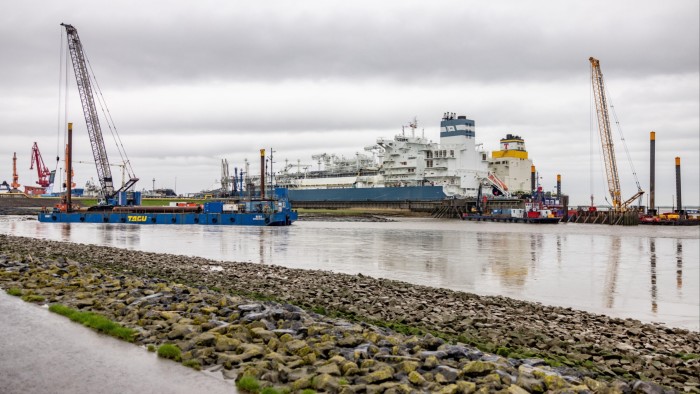Stay informed with free updates
Simply sign up to the EU energy myFT Digest — delivered directly to your inbox.
Germany has warned its state-operated gas import terminals to reject any Russian cargoes of liquefied natural gas, after it was notified of a planned shipment.
In a letter seen by the Financial Times dated November 6, the German economy ministry “instructs” Deutsche Energy Terminal “not to accept any deliveries of Russian LNG” after the company informed Berlin that its import facility in Brunsbüttel was set to receive a Russian cargo on Sunday.
The ministry said the order was issued to protect the country’s “overriding public interests”, calling on the operator “to reject LNG deliveries from Russia until further notice”.
The potential shipment comes at a time when LNG is set to become a bargaining chip for the EU and Donald Trump’s presidency, with European Commission president Ursula von der Leyen last week floating the idea of replacing Russian LNG with more imports from the US.
Germany was Europe’s biggest importer of Russian gas before Vladimir Putin’s full-scale invasion of Ukraine in 2022. When Putin cut gas supplied via pipelines to Germany and other European countries, the government of Chancellor Olaf Scholz raced to find alternatives and built a series of LNG terminals to receive gas shipments by sea.
In its letter, the German ministry said that were it to allow this shipment to go ahead, the LNG terminal would defy the very reason it was set up in the first place — making Germany and the EU as a whole “independent of Russian gas”.
But while the US and the UK have banned Russian LNG, the EU has continued to import the fuel — with 20 per cent of the fuel sourced in Russia, according to Kpler, a commodity data firm.
Most of the Russian LNG has gone to France, Spain and Belgium, under long-term contracts that companies involved say they cannot get out of unless a full-scale ban is imposed. Germany has not directly imported Russian LNG since Moscow’s invasion, and the instruction from the ministry “ensures that this continues to be the case”, the letter said.
Germany’s state energy group Sefe however has a long-term contract to bring LNG from Russia’s Yamal export facility, and it has directed nearly all of its supplies to an import facility in France, according to Kpler. The LNG is re-gasified there, and fed into the interconnected European gas pipeline system. Germany began receiving pipeline gas from France in October 2022.
DET declined to comment on the letter. Sefe did not immediately respond to a request for comment.
Germany’s economy ministry declined to comment directly on the letter, adding that “in principle, it is correct that Germany does not import Russian gas and it is also clear to the [ministry of economy] that this must not happen via German LNG terminals”.
The ministry is headed by vice-chancellor Robert Habeck, whose Green party has taken a tough stance on Putin.
Vessel tracking data has not yet identified any vessels that have signalled for the Brunsbüttel import facility, although three vessels that have left Yamal in recent days have indicated they are headed to Europe.
Source link









